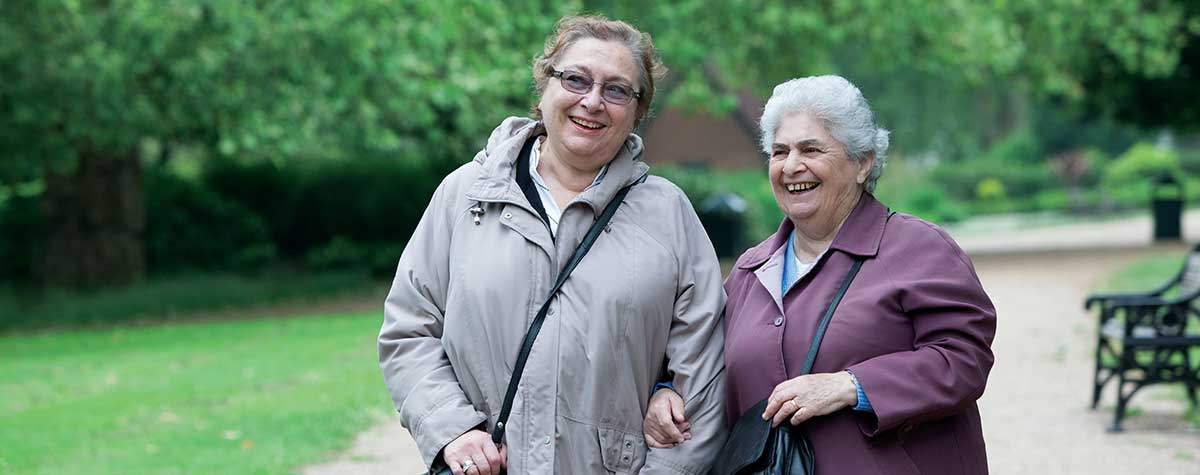Walking tips and advice

Regular exercise not only keeps you fit, but also increases flexibility, boosts your mood and safeguards your health. One of the easiest ways is to get walking - and here's how walking can improve your health.
A daily walk, even if it’s just a 15-minute stroll to the shops, can help to keep you active and, if you walk with friends, it can give your social life a boost, too.
How walking can improve your health
1. Walking helps with weight loss
Taking regular exercise is especially important as we get older and our metabolism slows down, making us more likely to put on weight.
The only way to lose weight is to use up more energy that we take in, and a daily walk can help to burn off some of those calories.
The number of people who are overweight or obese is rising. The latest Health Survey for England (2014) showed the following groups as overweight or obese:
- 78% of men aged 65 to 74
- 80% of men aged 75 to 84
- Over 70% of women aged 65 to 84.
2. Brisk walking helps to keep the heart strong
According to the British Heart Foundation, over 1 in 7 men and nearly 1 in 10 women die from coronary heart disease (CHD) in the UK. However, people who are physically active are at lower risk of CHD.
Brisk walking can help to keep your heart strong by increasing your heart rate. It can also reduce your risk of heart disease and high blood pressure in the long-term.
High blood pressure is also a key risk factor for stroke, which usually affects people over the age of 65. Some communities are also at higher risk from heart disease. For example, people of South Asian origin are at particular risk of CHD. Experts think this is because of diet and lifestyle.
3. Physical exercise reduces your risk of developing cancer
According to Cancer Research UK, cancer causes more than 1 in 4 of all deaths in the UK. Physical activity can reduce your risk of developing some cancers, including breast, bowel and womb cancer.
The benefits of exercising in later life
Ken Fox, professor at Bristol University, talks about the benefits of staying active as we age
4. Walking also reduces your risk of developing type-2 diabetes
There are 3.9 million people living with diabetes in the UK in 2015. Most of these cases are Type 2 diabetes, which is more likely to affect adults and those who are overweight or obese.
People in some communities are more likely to have diabetes than others. For example, people of south Asian descent can be up to 6 times more likely to have diabetes than the general population. African-Caribbean, Black African, and Chinese people are also more at risk.
However, you can reduce your risk of developing Type 2 diabetes with regular exercise and a healthy diet.
5. Walking can help strengthen your bones
Walking can help to strengthen bones, helping to prevent the onset of osteoporosis, which makes bones brittle and more likely to break.
According to the National Osteoporosis Society, 1 in 2 women and 1 in 5 men over the age of 50 will break a bone largely due to osteoporosis during their lifetime.
6. Walking will improve your mood and mental wellbeing
Regular exercise will improve your mood and increase feelings of wellbeing - and it can even help to relieve depression. Being outside in the fresh air has been linked to better mental wellbeing and reduced stress.
Walking can also be a social activity when done in a group or with friends, so it can help to tackle feelings of isolation or loneliness.
7. Being physically active can reduce your risk of developing dementia
It is now thought that being physically active and leading a healthy lifestyle could reduce the risk of developing dementia.
Exercise is also beneficial for the wellbeing of people with dementia. It can lead to improved strength and flexibility, better sleep, and some studies suggest it may improve memory and slow mental decline.
How much exercise do you need?
Current government advice recommends that adults aged 65 or over, who are generally fit and have no conditions that limit their mobility, should aim for 150 minutes of moderate-intensity activity each week.
Don’t be put off if this seems a lot. You can break it down into 10 or 20-minute blocks and build up gradually from your current level of activity as we suggest in our tips below.
Even just sitting down for less time and moving about a little more can start to make a difference.
You can find out more about physical activity guidelines for adults from the NHS

Going to walking football makes me feel part of a team. It's something to look forward to.
A little every day
Brisk walking counts as a moderate-intensity activity, provided that you set a pace where you feel a little bit out of breath but can still carry on a conversation.
Don’t feel that you have to take long walks every day. It’s best to try to make walking a part of your everyday routine.
The best way to do this is:
- walk to the shops instead of driving
- use the stairs instead of the lift or escalator
- when driving, park at the far end of the car park so that you have further to walk
- plan a town or country walk at the weekend
- join a walking group. It’s fun to walk with other people and you might even make some new friends.
Speak to your GP if you're inactive or have health concerns
If you’re not already active, or have any health concerns, it’s important to check with your GP to find out if it’s safe for you to start or increase your walking.
Simple tips for successful walking exercise
The great thing about walking is that you don’t need any specialist equipment. Just remember to wear comfortable shoes, ideally a pair of trainers.
We asked personal trainer Gina Hemmings to share her 6 simple steps to successful walking.
1. Start slowly
If you’re not used to exercise, walk 10 minutes from home and then turn around and walk back. Increase this by a minute or two every day
2. If you're not slightly out of breath, it's not working
Make sure that you feel slightly out of breath and are perspiring slightly. This is a good indication that you’re walking at the right pace.
3. Gradually increase the intensity
When your walk starts to feel easier, increase the intensity by taking longer strides and swinging your arms by your sides.
4. Consider walking on a treadmill
If you have knee, hip or joint problems, consider walking on a treadmill as they are cushioned which helps to reduce the impact on the body.
5. Look for soft ground outdoors
If you’re walking outdoors, you might find it more comfortable to walk on soft ground instead of pavements.
6. Wear thin layers
Wear thin layers so that you can take something off if you get too warm. Depending on the weather and the distance you’re walking, you might also want to carry a bottle of water, a snack, sunscreen, a sunhat and a waterproof jacket.
A small favour
All the information and advice we provide on the website is free and completely independent, as is our Advice Line that is open 365 days a year.
But demand is going up. We are an ageing population and more people than ever are coming to us for support, which is why we need to ask for help.
If you are able to, just a small gift today could help us reach even more older people wherever the need is greatest.
Age NI Advice Service
Every year our Advice Service deals with thousands of calls from older people in need. Call us today to make sure that you are receiving all the help and support available to you.
